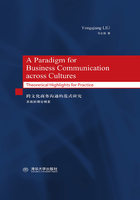
Chapter 1 Defining a Paradigm for Business Communication across Cultures
Abstract Current business communication studies witness theoretical separation of communication theories from organizational strategies, culture, language, business functional activities and contextual factors whereas globalization requires that such separation and misunderstanding resulted in hereby should be surpassed to achieve effective and seamless communication among citizens in this global village. Therefore, this chapter defines all these elements first and thereby constructs an integrative and theoretical paradigm for business communication across cultures. This conceptual paradigm bridges the theoretical gaps between organizational strategies, culture, language, business functional areas, communication elements and process, and environmental factors. It adopts a multidisciplinary approach to identifying organic relations between all disciplines involves in with communication in global context of diverse cultures. The conceptual model constructed herewith defines the theoretical border of business communication across cultures and serves as a theoretical foundation of the whole book.
Keywords communication paradigm, business communication, cultures, language, cross cultural communication
The world is flat and we live in a global village (Friedman, 2007), where business activities are undertaken in multi-cultural context and business people are challenged with many culture shocks and conflicts. Shi & Wang (2014) identify eight major influential causes of culture shock, namely, business communication, language, individualism, collectivism, power distance, time orientation, religion, and tradition. They find that Chinese expatriates encountered some cultural shocks in international business context and were greatly affected by communication, language, religious and traditional issues. The study further reveals three major difficulties in the cross-cultural adaptation: poor adaptability of business communication, language barriers and heavy pressure from work duties. They point out that business communication becomes the top issue when doing business in global context. Inevitably, current business communication faces a challenge of how to understand culture, which offers a thinking framework to encode and decode messages communicated across country borders. There follows another challenge to communicate effectively in this global village, i.e.the effective use of language as a communication tool to decode and encode messages received from other culture backgrounds. Yet, language is much more than just a communication tool. It is a thinking instrument as well as a communication tool. Moreover, business communication activities are initiated to realize business strategic intentions of global business game players and are restricted with legal regulations from home and host countries, international laws and international agreements. Therefore, business communication researches require an overarching framework to organically link together all such elements as business strategies, culture, language, legal regulations, and well-defined international business functions. In short, there is a necessity to link international business theories with communication theories to create a new paradigm for communication to carry out systematical business functions in multi-culture context.
To satisfy such necessity, this study develops the multidisciplinary linkage within an overarching paradigm for business communication in a context of diverse cultures. Overwhelming amount of literature on business communication reveals that business theories and functional activities, and cross cultural communication strategies have been separated from each other in the business communication studies. Studies in this field only focus on developing language skills in establishing intrapersonal relations in international business context. Therefore, most of academic articles and books on business communication fall into English writing, which has links with certain business functional activities in one way or another rather than in a systematical manner. In essence, they are English language studies. On the other hand, there are researches which are abstractly discussing communication theories on communication elements, process and so-called know-how for effective communication. These studies offer no organic and systematic linkage between culture and language with business functional areas either. Obviously, there is a necessity to define theoretical border of business communication in global cultural context.